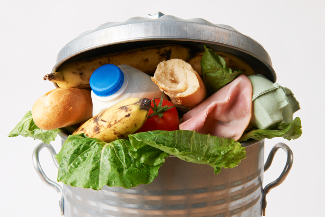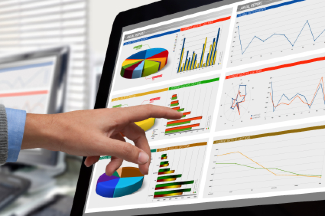Member State Page : Denmark
Last updated on the 29/09/2023

Per capita: 229 kg in 2021
In total: 1 344 550 tonnes in 2021

Primary production: 57 985 tonnes in 2021
Processing and manufacturing: 607 693 tonnes in 2021
Retail and other distribution of food: 99 791 tonnes in 2021
Restaurants and food services: 72 081 tonnes in 2021
Households: 507 000 tonnes in 2021

National target: Reduce the amount of food waste across the food supply chain
Target
The target of the Government of Denmark is to reduce the amount of food waste across the whole food supply chain.
Furthermore, ONE\THIRD has launched the voluntary agreement Denmark against Food Waste where food business operators along the entire food value chain can commit to monitoring and reporting their food waste data – working towards reducing food waste by 50% by 2030.
Measure
The Danish Environmental Protection Agency is in charge of measuring the amounts of food waste generated across the entire value chain (i.e. the five sectors mentioned above). All measurements follow the common methodology set out in the Commission Delegated Decision (EU) 2019/1597.
The table above with sectoral food loss and waste (FLW) data presents the results from studies across the value chain.
The studies on food waste from the primary production and the processing and manufacturing sectors are based on surveys, interviews and statistical data.
The study on food waste from the retail sector is based on voluntary data from relevant stakeholders from the sector.
The study on food waste from restaurants and the food services sector is based on compositional analysis and national waste data.
The study on food waste at the household level was carried out by using waste compositional analysis from households located in four different Danish municipalities. Findings reveal that the total food waste in 2021 amounts to 507 000 tonnes.
Act
In 2019, the Danish Government established the Think Tank on Prevention of Food Loss and Food Waste – ONE\THIRD and launched the Denmark against Food Waste voluntary agreement, where food business operators along the food value chain can commit to monitor and report their amounts of food waste thereby contributing to achieving the target of reducing food waste by 50 % by 2030.
The aim of ONE\THIRD is to form partnerships between stakeholders from food businesses, non-governmental organisations, research institutions and public authorities in order to raise awareness, promote initiatives, share science-based knowledge and exchange best practices concerning food loss and waste reduction initiatives. The Think Tank consists of a board and around 30 members recruited from the public and private spheres, representing the whole food supply chain.
The work of ONE\THIRD is guided by the following five objectives:
- Support the civil society's battle against food loss and food waste;
- Contribute to general business opportunities;
- Offer insights on how to overcome barriers to prevent food losses and food waste;
- Ensure that data collection and impact assessments are improved; and
- Cooperate with foreign partners on know-how and sharing of experiences.
Recommendations on food losses and food waste were also issued under the 13 Climate Partnerships established by the Danish Government in 2019. These inputs guide national initiatives to reduce food losses and food waste along the entire food supply chain.
The Danish Veterinary and Food Administration is cooperating with official authorities, companies and research institutions to boost and optimize the industry for ingredients and raw materials. The national Danish ingredients strategy (2019) aims to contribute to the Sustainable Development Goals (particularly SDG 12.3) by trying to minimise barriers for innovative new solutions that can reduce food waste, e.g. by prolonging shelf-life or utilising sidestreams from food and feed production. For example, by simplifying approval procedures for ingredients that pose no food safety risk and can contribute to reducing food waste. A National Bioeconomy Panel was set up to develop new and sustainable value chains for bioeconomy in Denmark. This covers renewable biological resources and the conversion of these resources and their waste into products such as food, feed, biomaterials and bioenergy.
The Danish Ministry of Food, Agriculture and Fishery has established a task force on food loss and waste in 2023. This task force will provide recommendations on how to simplify donation regulation regards FLW, in order to make it easier for Danish food companies to implement initiatives to prevent FLW.
To assist retailers in reducing food waste, The Foodwastehunters 2.0. launched in 2021 with the purpose of reducing food waste in the Danish retail. Retailers were offered assistance from a so-called “food waste hunter” that provides guidance, methods and recommendations to reduce food waste in a hands-on and practice based manner.
The Danish Veterinary and Food Administration is carrying out a control- and guidance campaign from August-October 2023. The campaign is targeting retail businesses that receive food donations. Food waste initiatives are supported and highly appreciated with the prerequisite that food safety is not compromised. Thus, the purpose of the campaign is dual; to guide food waste organisations, and to check the organisations' compliance with food safety legislation with focus on traceability, labelling with allergens and facilities for hygienic washing and drying of hands.
On the conversion to organic food of professional public kitchens, studies commissioned by the Danish Veterinary and Food Administration have shown that kitchens have not only been able to increase the procurement of organic products, but at the same time they have reduced food waste significantly. The organic price premium is partly covered by reducing food waste, allowing more organic meals without an increase in operating budgets.
In order to raise awareness on the issue of food waste, Denmark launched a National Food Waste Day celebrated yearly on 29th of September (aligned with the UN International Day of Awareness of Food Loss and Waste). The aim is to give further visibility to civil society initiatives and to inform and instruct citizens about how to save food.
Several consumer information campaigns on the meaning of date marking have been carried out and extensive guidelines on the meaning, understanding and handling of date markings have been established. Aarhus University has conducted several studies on date marking with the aim of improving consumer understanding of date marking.
The report ‘Consumer food waste in Denmark’ (2018) published by the Aarhus University offers a better understanding of consumers’ perceptions and behaviours related to food waste, in order to inform measures to limit such waste. The report ‘Consumer behaviour towards food waste in families with children’ (2021) examined food-related practices and food waste drivers in families with children, and suggested tools for help families reduce their food waste.
Several food business sectors have developed guidance on food waste reduction and some businesses have introduced additional training for staff, including on the possibility to donate surplus food. The Ministry of Food, Agriculture and Fisheries has also facilitated a task force on detecting and easing barriers on donation and redistribution of food waste.
Research and innovation are key in order to define and implement initiatives that ensure an optimal use of food at each stage of the food supply chain, focusing on the best destination for surplus food and a maximal valorisation of edible food resources. Some R&I projects carried out in Denmark include:
· Sustainable use of fish skin for food ingrediens and healthy snacks (InnoSkind), GUDP 2018-2022.
· QC-CREW - Quality Control of Cheese production with RE-used process Water, GUDP, 2018-2022.
· Sprayless - Reduced fruit waste by non-chemical approaches to control strawberry grey mould, GUDP, 2017-2022.
